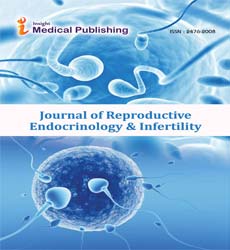Division of Reproductive Endocrinology and Infertility
Torie Comeaux Plowden M.D., M.P.H
Torie Comeaux Plowden*
Department of Gynecologic Surgery and Obstetrics, Womack Army Medical Center, Fort Bragg, North Carolina
- *Corresponding Author:
- Torie Comeaux Plowden
Department of Gynecologic Surgery and Obstetrics, Womack Army Medical Center, Fort Bragg, North Carolina
E-mail: torie.c.plowden.mil@mail.mil
Received Date: November 04, 2021; Accepted Date: November 18, 2021; Published Date:November 25, 2021
Citation: Plowden TC (2021) Division of Reproductive Endocrinology and Infertility. J Rep Endo Infert. Vol.6 No.6: 33.
Commentary
You may turn to the experts of the Division of Reproductive Endocrinology and Infertility if you have conditions related to infertility, including fibroid tumors, recurrent pregnancy loss, abnormal uterine bleeding, endometriosis and risk of genetic disorders in offspring. Our doctors are leaders in managing complex fertility problems, including infertility, cancer and fertility (oncofertility), diminished ovarian reserve, recurrent pregnancy loss, uterine fibroids, endometriosis, congenital uterine anomalies, and conditions with a risk of genetic disorders in offspring.
Mayo Clinic offers an integrated approach to diagnosis and treatment of fertility-related disorders, including fertility preservation and ovarian transplant. In addition, the clinic has the most advanced IVF laboratory featuring an incubation system that allows real-time observation of embryo development. Mayo is one of a few clinics in the United States to offer this technology. Our doctors are experts in fertility preservation for reproductiveage people with serious medical illnesses where treatment may impair future fertility.
Your visit to Mayo Clinic may include evaluation by doctors in other specialties and comprehensive diagnostic testing and counseling. The staff doctors of the Division of Reproductive Endocrinology and Infertility are board-certified in obstetrics and gynecology and reproductive endocrinology and infertility.
Reproductive surgeries: Many gynecologic surgeries can reduce your fertility. Our reproductive surgeons specialize in techniques shown to maintain or optimize your fertility potential. Specialists in this area use minimally invasive approaches to treat uterine fibroids, endometriosis, uterine polyps, uterine adhesions, and abnormalities of the uterus or fallopian tubes. They also perform outpatient microsurgery to reverse tubal ligations and offer innovative fibroid treatment options such as robotic myomectomy and MR-focused ultrasound surgery.
Clinical practice for most REI doctors includes a combination of reproductive endocrinology and infertility. In most cases, infertility practice predominates with REI physicians considered the experts in advance fertility care with techniques such as in vitro fertilization. Other REI physicians may practice with an emphasis on reproductive endocrinology issues. Like all OB/GYN subspecialties, REI physicians also perform surgery. Common surgeries include abdominal myomectomies (removal of fibroid tumors), tubal anastomosis, and operative laparoscopy for tubal disease, endometriosis and pelvic adhesions, hysteroscopy myomectomy, incision of uterine septum, lysis of adhesions and removal of polyps. Some REI physicians perform complicated surgeries for congenital abnormalities including creation of neo-vagina and resection of vaginal septum. REI physicians in academic practice often continue research efforts with both clinical and basic science research a possibility. Others participate in medical education.
Fertility preservation
Fertility preservation services offered include: Freezing of unfertilized eggs (oocyte cryopreservation), Freezing of fertilized eggs (embryo cryopreservation), Freezing of ovarian tissue (ovarian tissue cryopreservation), Freezing of sperm (sperm cryopreservation)
Success rates for in vitro fertilization (IVF) programs are readily available to the public. When choosing a fertility service provider, you may be tempted to compare programs based on success rates. However, many clinics and IVF programs publish success rates even though the Centers for Disease Control and Prevention and the Society for Assisted Reproductive Technology (SART) recognize that direct comparisons between clinics aren't possible:
Different clinics have different patient populations and practice styles, Programs vary greatly in the screening process for people before an IVF cycle and may not be willing to care for someone with a particularly challenging history or medical condition.
Embryo development technology: At Mayo Clinic, fertility specialists provide high-quality care through expertise, attention to detail and innovation. Time-lapse imaging of embryo development is one example of an innovative technology that Mayo Clinic fertility specialists have adopted to provide patients with the very best outcomes.
LGBT services: Many people in the lesbian, gay, bisexual and transgender (LGBT) community face unique challenges in building a family.
The Mayo Clinic Assisted Reproductive Technology Program enthusiastically supports the reproductive needs of this community by offering a variety of reproductive services that enable family building, including:
Donor sperm insemination, Donor egg, Gestational carrier cycles, Use of both a gestational carrier and an egg donor
The first step is to schedule a consultation with one of the providers in the Division of Reproductive Endocrinology and Infertility to discuss the options and to make a plan that fits your needs.
Open Access Journals
- Aquaculture & Veterinary Science
- Chemistry & Chemical Sciences
- Clinical Sciences
- Engineering
- General Science
- Genetics & Molecular Biology
- Health Care & Nursing
- Immunology & Microbiology
- Materials Science
- Mathematics & Physics
- Medical Sciences
- Neurology & Psychiatry
- Oncology & Cancer Science
- Pharmaceutical Sciences
